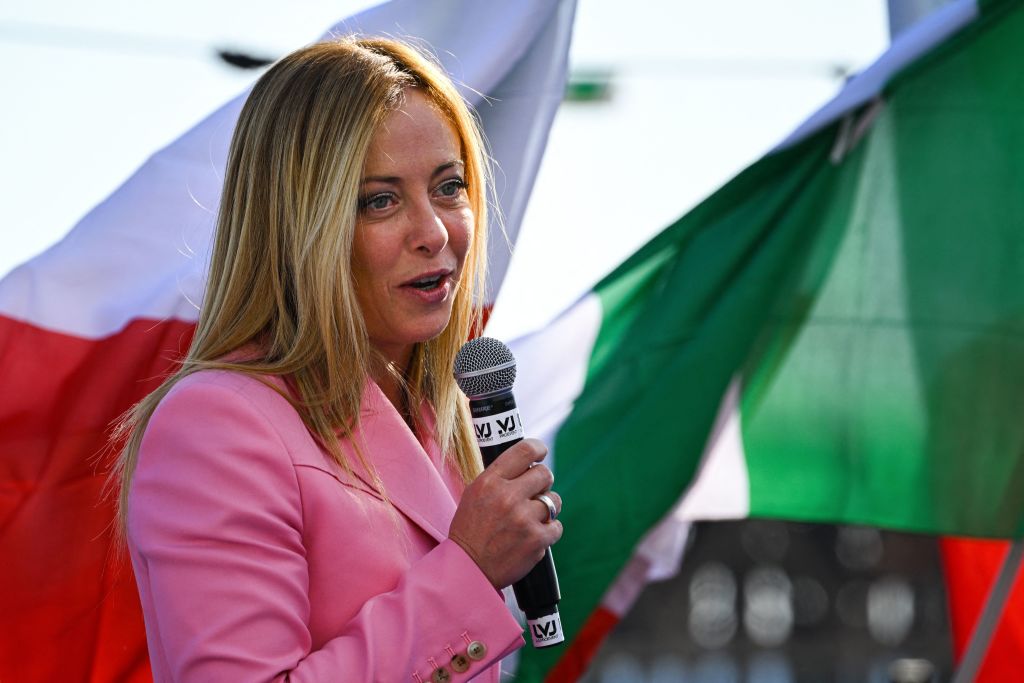As Italians prepare to vote in today’s general election, the European Union has issued a warning – making clear that it stands ready to act.
Giorgia Meloni, leader of the Brothers of Italy party, is widely expected to become prime minister at the head of a right-wing coalition. At an event in Princeton University, Ursula Von der Leyen, the EU president, said she is watching. ‘If things go in a difficult direction, I’ve spoken about Hungary and Poland, we have tools,’ she said.
So the unelected Ms Von der Leyen is talking about what she might do if confronted by Meloni being elected and getting ‘difficult’. The ‘tools’ she refers to are those used to withhold funds from Hungary and Poland for alleged violations of what the European Court of Justice has termed the EU’s ‘common values such as the rule of law and solidarity’, mainly in respect of the judiciary and media. That an unelected EU Commission should punish democratically elected governments in Hungary and Poland for failing to uphold common values is extraordinary – that it should threaten to do so in Italy if Meloni is elected and does not behave is outrageous.
Such behavour by the EU is hardly surprising. It reflects the default view of the Euro Establishment on Meloni – the ‘heir to Mussolini’ – which lazily brands her ‘far-right’ or ‘post-fascist’. She is neither, for reasons I explain at length in my recent Spectator interview with her in Rome. Her victory would be a triumph not for dictatorship but democracy. That is to say, if she wins, she will be Italy’s first elected prime minister for 14 years after six unelected prime ministers in a row. And she will be the first-ever woman to hold the post. That, surely, is something to be welcomed in a country often called the ‘beating heart of Europe’?
Meloni identifies as a conservative and takes inspiration, not from Benito Mussolini, but from old-fashioned English conservatives
The more immediate point is that, assuming the opinion polls, which have been as usual suspended two weeks before the elections, were not wildly off, Meloni’s Brothers of Italy party is very popular and she will lead a coalition government that Italians call the ‘centrodestra’ (centre-right). Not the far right. And if this coalition does get enough votes to form a government it will achieve what no party or coalition has managed to achieve in Italy since Berlusconi’s right-wing coalition won the general election in 2008.
None of the six prime ministers since Berlusconi resigned in 2011 was leader of a party or coalition that got the most votes at a general election. Four were not even elected parliamentarians when appointed prime minister. So, on Sunday, the coalition of the right, whose other two main elements are Matteo Salvini’ìs radical Lega and Berlusconi’s moderate Forza Italia, looks set to win a famous victory.
According to one projection, commissioned earlier this month by the prime time political talk-show Otto e Mezzo, and based on the last polls before the pre-election black-out, the coalition will secure 246 of the 400 seats in the Chamber of Deputies (Italy’s lower house).
This would place it way ahead of its main rivals, the left-wing coalition led by the Partito Democratico (PD) which would get 92 seats, the alt-left Movimento 5 Stelle 34 seats, and a second left-wing coalition, the Terzo Polo, 18 seats.
Even if all these left-wing parties and coalitions managed to swallow their hatred of each other to form a ‘stop Meloni’ alliance, that poll suggests they would not have enough seats. The only real unknown that could affect the result is what the one fifth of undecided voters do.
The Italian media, which is mostly left-leaning, usually call both Meloni, her party and her coalition centrodestra rather than ‘destra’, a word which the Italians apply to actual extremists. That ought to make the outside world think twice before describing Meloni as the heir to Mussolini. That’s not to say the Italian media is well-disposed to her – most of them are not. They are just forced to be more accurate, given that their readers can see and hear every day what Meloni and Brothers of Italy are doing and saying. Italians know through experience who is and is not a fascist.
Those trying to stick the f-word on her point to a handful of things – only one of which I find even remotely convincing. As a teenager Meloni, who is 45, signed up to Italy’s neo-fascist Movimento Sociale Italiano (MSI) which had by then renounced dictatorship and anti-Semitism. Two years later in 1994, it became Alleanza Nazionale (AN) which renounced fascism. But Brothers of Italy which she co-founded in 2012, and whose name is that of Italy’s national anthem, retains – as AN had – the tricolore flame which was MSI’s logo. Many insist this is proof of Meloni’s refusal to abandon fascism. But she says the flame is the symbol of the journey by the post-war Italian right which existed before fascism.
Meloni identifies as a conservative and takes inspiration, not from Benito Mussolini, but from old-fashioned English conservatives such as Sir Roger Scruton and JRR Tolkien, as I discussed at length in my interview with her. At the right’s final rally of the election campaign in Rome’s Piazza del Popolo on Thursday the actor who introduced her on stage before her speech paraphrased what Aragorn told the men of the west before the Battle of Morannon at the Black Gate in the film version of Lord of the Rings: ‘The day of defeat may come but it is not this day! This day we fight!’
Meloni did not go to university and speaks with a rough Roman accent, which makes her the Italian equivalent of a cockney. Which is why it’s odd to hear her compared to Thatcher. This is true in terms of her iron-like character, but not her politics. She is more like an old-fashioned conservative who is often paternalistic in her language, arguing that the state must sometimes protect countries and communities from the free market.
While Berlusconi and Salvini have been in trouble for their pro-Putin sympathies, Meloni unequivocally supports Nato’s arming of Ukraine. So might her coalition partners lure her away from this path given that more than half of Italians oppose sending arms to Ukraine? She told me that, in the coalition agreement she drew up with Salvini and Berlusconi at the start of the campaign she made support of Nato’s Ukraine arms programme a condition.
Stridently conservative on social issues she opposes gay adoption (but not gay civil unions). A passionate and effective public speaker, she famously shouted at a rally in Rome in 2019: ‘They want to call us parent 1, parent 2, gender LGBT, citizen X, with code numbers. But we are not code numbers… and we’ll defend our identity. I am Giorgia. I am a woman. I am a mother. I am Italian, I am Christian. You will not take that away from me!’
These words that brilliantly encapsulate her politics were turned into a pop song by two DJs who hoped to make her a laughing stock. Instead, the song became a massive hit that made her more, not less popular. She used the words ‘I am Giorgia’ as the title of her autobiography published in 2021 and already in its 15th edition. She has been under huge democratic scrutiny as she laid out her pitch to become prime minister and Italians are about to pass their verdict.
Meloni herself, a eurosceptic who once called for Italy to leave the euro and who believes the EU should ‘do less better’, has not retaliated against Von der Leyen, pointing out that the Commission has already rowed back on her comments by saying it would work with any government. ‘When you meddle with the democracy of a member state, you damage the credibility of the Commission,’ said Meloni. ‘I advise prudence.’
Von der Leyen would do well to heed Meloni’s advice and moderate her language: Italians have had enough of being run by unelected EU-friendly technocrats like Mario Draghi and are about to elect their first-ever woman leader. Such wanton acts of democracy may go down badly in Brussels, but Von der Leyen had best get used to it. There will be more to come.







Comments